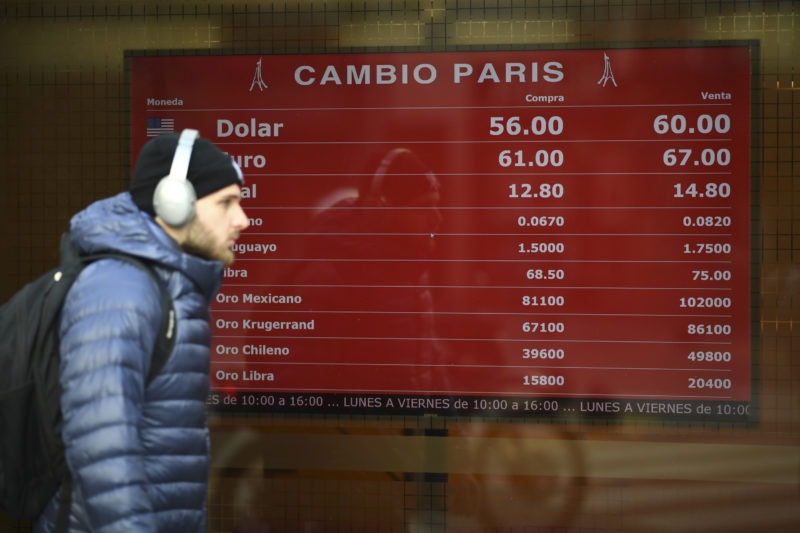Argentine peso halts slide, closes up more than 4%
Currency exchange values are displayed on the buy-sell board of a bureau de exchange in Buenos Aires, on August 13, 2019, after the peso plunged in value: it halted its slide on Thursday (RONALDO SCHEMIDT)
Buenos Aires (AFP) – Argentina’s peso halted its slide Thursday, closing up more than four percent following three days of sharp declines as President Mauricio Macri grappled with a crushing political defeat.
The rebound, which left the peso at 59.72 to the dollar, came after both Macri and the center-left opposition candidate who trounced him in Sunday’s primaries, Alberto Fernandez, called for calm.
The peso had slipped to 62.18 to the dollar at close on Wednesday having closed at 46.55 on Friday.
Fernandez, now favorite to unseat Macri in October’s presidential election, said his economic policy did not contemplate a debt default.
“Our proposal does not involve default risks, though it does imply a different operating logic,” said Fernandez.
On Thursday, Fernandez said he considered an exchange rate of 60 pesos to the dollar as “reasonable” and said it should no longer fluctuate wildly.
Macri suffered a resounding defeat in Sunday’s nationwide primaries, signaling a loss of public confidence in his IMF-backed austerity measures with just months to go before October presidential elections.
Center-right Macri polled just 32 percent of the total votes cast compared to Peronist candidate Fernandez’s 47 percent, leaving the center-left candidate as the overwhelming favorite in the race.
The results sent the currency and stock markets tumbling on Monday, with the peso losing more than a quarter of its value over three days.
The Buenos Aires stock exchange crashed 38 percent on Monday while on Wall Street shares in Argentine companies plummeted more than 50 percent and Argentine bonds were down 20 percent.
Macri reacted on Wednesday by announcing salary hikes and tax cuts to win back voters while calling for “dialogue” with the opposition to “convey peace of mind in this electoral process.”
Macri later tweeted that he and Fernandez met and pledged to work together to ensure the economy is affected “as little as possible.”
Fernandez, meanwhile, assured markets and voters that his election as president would “not imply the risk of default, it implies a different operating logic.”
Argentina defaulted on its debt in 2001 amid the worst economic crisis in its history.
The country is currently in a recession and posted 22 percent inflation for the first half of the year — one of the highest rates in the world.
Poverty affects 32 percent of the population.
Disclaimer: Validity of the above story is for 7 Days from original date of publishing. Source: AFP.


